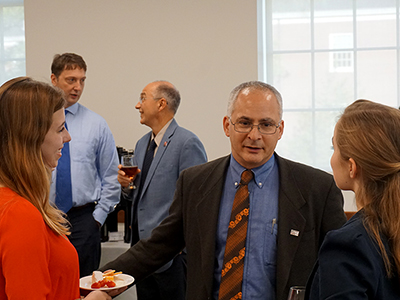Legal expert Benjamin Wittes gives 7th Annual Darrell West Lecture for the Dept of Political Science

Written by Maia Anderson, CAS communications intern

Benjamin Wittes addresses the audience.
Benjamin Wittes, a nationally renowned expert on legal and US national security policy and Senior Fellow in Governance Studies at Brookings Institution, came to Miami on September 26 to give the 7th annual Darrell West Lecture in American Politics.
Wittes' lecture was titled, "The Unitary Executive in the Age of Donald Trump."
"There's a great deal of interest out there right now in understanding presidential power in the context of the Trump Administration and its relationship to the other branches of government," said Bryan Marshall, professor and chair of political science. "So it is an ideal time to have such a serious policy and political thinker like Ben Wittes here at Miami to analyze the changes and consequences of executive power under President Trump."
Talking One-on-One about the Future of Politics
Wittes, who is also the editor-in-chief of the legal blog Lawfare, held an informal lunch meeting with several political science students earlier in the day before the lecture. The lunch gave students the opportunity to ask Wittes questions about his career.
One student asked Wittes his thoughts on the Supreme Court hearings for now-confirmed Judge Brett Kavanaugh. Wittes shared his personal relationship with the hearings, describing his 20-year friendship with Kavanaugh.

Benjamin Wittes chats with students during the reception.
"I have as many mixed feelings as it is possible to have," said Wittes, referring to the allegations of sexual misconduct against Kavanaugh. "I'm generally of the view that large numbers of people do not come forward and make allegations, all of them lies."
Wittes, an expert on the judiciary process, talked with students on the harsh investigation all nominees to the Supreme Court must endure to be confirmed.
"This process will find the worst things that you've ever done," said Wittes.
Wittes also gave advice to students preparing to graduate.
"Everybody thinks that a career is something you plan," said Wittes. "It's not. I don't think it's possible to plan a career."
Wittes advised students to open themselves up to a wide range of job opportunities and experiences.
"The only path you can imagine is the ones that a thousand other people have beaten and trod before them, and trodding them will make you just like them,” said Wittes. “If the goal is to have fun and to make a career out of having fun, that’s the only way I know how to do it.”
The Unitary Executive
“Since the so-called backlash against the Imperial Presidencies of the Johnson and Nixon Administrations, we've witnessed a sharp rise in presidential power," said Marshall. "The Trump Administration has continued on this trend toward the growth in presidential unilateralism. Ben Wittes explores the Hamiltonian ideas of the unitary executive and brings to the forefront the implications of contemporary presidential power under President Trump."
In his lecture, Wittes discussed the current problems facing the executive branch.
“We should be concerned about the corrosion of the executive branch,” he said.
The branch, said Wittes, is vertically integrated, meaning all members work underneath the president. This means the president holds all authority in the executive branch.
"By and large, the unitary executive is a good thing," said Wittes.
However, he added, three things have contributed to the deterioration of the executive branch. He described them as "completely antithetical to the concept of unity."
The first element he discussed was contradiction of the president. Contradiction started the first day of Trump's presidency, according to Wittes, when Trump falsely boasted that his inauguration crowd was bigger than Obama's.
The second was defiance of the president. He discussed Bob Woodward's latest book, Fear. He says the book is filled with people not doing what the president tells them.
"That's a scary thing," said Wittes.
Wittes described the dangers of allowing cabinet members to control the president's actions, considering the public does not elect cabinet members.
"No one voted for Gary Cohen, Jim Mattis," said Wittes. "There is something frankly undemocratic about the subversion of the democratic branch. People voted for Donald Trump knowing exactly who he is."
He discussed the dangerous precedent set by the events described in Woodward's book, when cabinet members would remove documents from the president’s desk without his knowledge in order to prevent him signing agreements they didn't believe were good for the country.
"What happens the next time there is a president who is a more normal president but the cabinet just doesn't believe in them? Will they feel more comfortable manipulating and defying the president?" Wittes asked.
The third element Wittes discussed was the manipulation of the president. He discussed the issues of information control and loyalty. According to Wittes, Robert Mueller is a model the president should be following when it comes to being perfectly vertically integrated.
"He commands enormous loyalty," said Wittes. "Trump talks about loyalty. but he doesn't command any loyalty. The White House has very little information control."
The Darrell West Lecture, sponsored by the Department of Political Science, was designed to teach students how politics shape their lives and encourage them to think critically about policy and politics so they will be informed in ways to help them affect change in the future. West is a Miami political science alumnus from the class of 1976 and is now the Vice President and Director of Governance Studies at the Brookings Institution.
- Learn more about Benjamin Wittes (The Brookings Institution)

